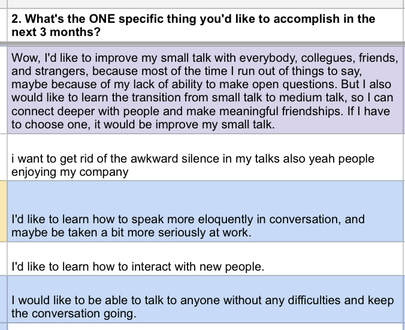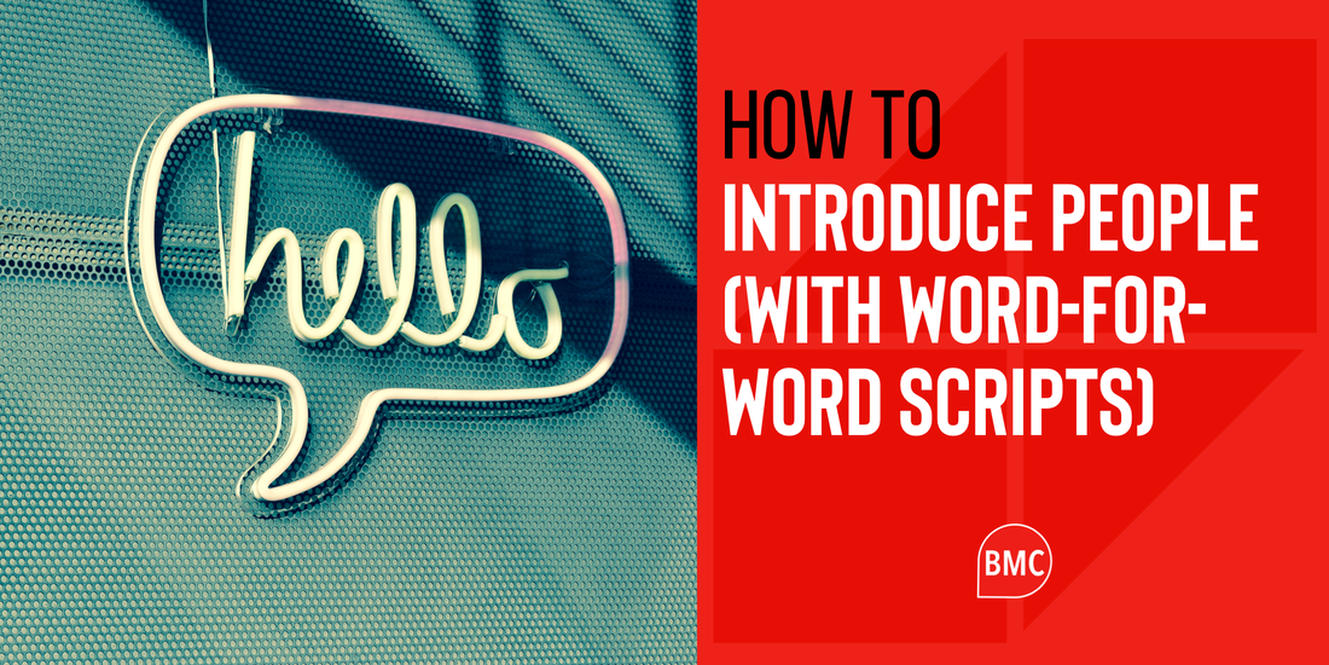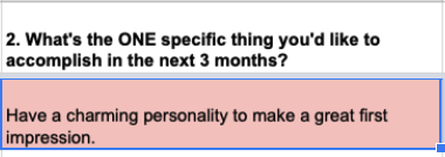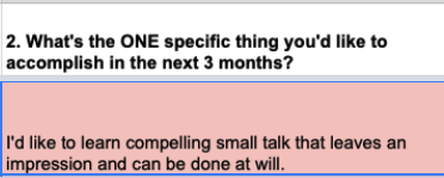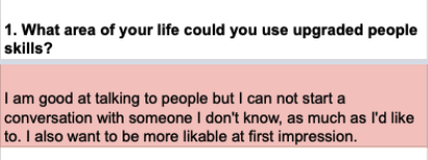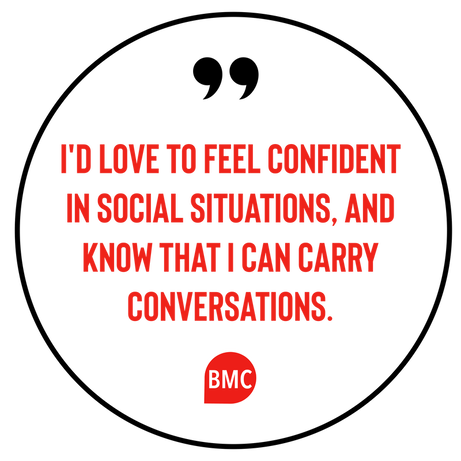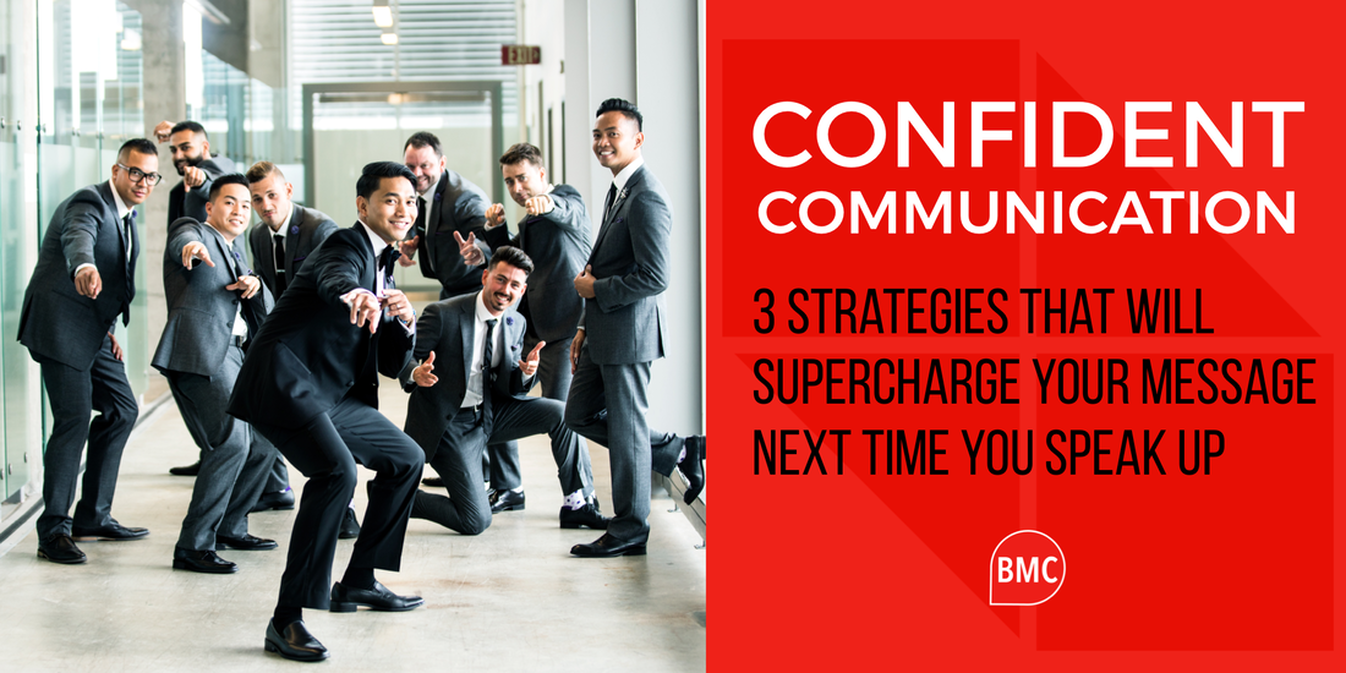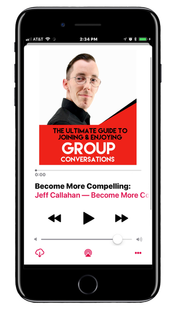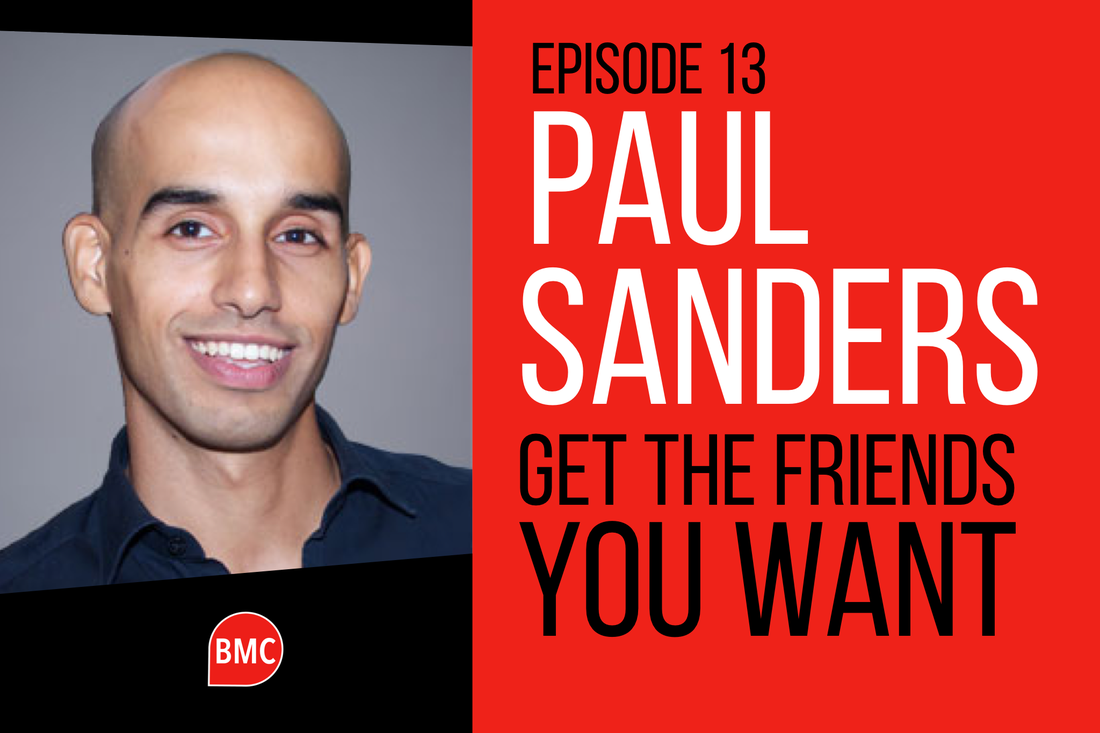|
How to never run out of things to say...ah, this may be the holy grail of people skills...
If you've ever had your mind spontaneously go blank in the middle of a conversation, then you know this feeling... Searching your mind for something...anything to say. Yet, the harder you try to come up with something, the less you have to say. Then the awkward silence creeps in...you might think to yourself: "Why does my mind go blank all the time?!" That overthinking vortex sucks. I'm here to help.
Recently I've received messages from people who are struggling with their minds going blank...
I have great news for you:
In this article, you'll learn:
After reading this article, you'll be able to make conversation with the best of 'em.
Let's dive in...
We’ve all been there…
You’re in virtual meeting after meeting and it feels like ALL you do is hop into business. It’s nearly impossible for someone to stay in work mode all day, and an occasional pivot to something a little more exciting than work can be very beneficial. Icebreaker questions are great ways to connect with people, bolster team building, make new people feel welcome, and learn a bit about yourself, too! Icebreaker questions can also…
As more companies go remote, it’s going to be easy to hop into the trap of Zoom meeting after Zoom meeting with no team building moments… But you can prevent it with a little excitement and change! This list of 170+ Icebreaker questions will make your next 4-hour planning meeting fun (well… somewhat, at least). Also--these questions can also be used at an after-work happy hour, meetup, or whenever you’re meeting a group of new people!
Have you ever watched someone give a presentation or run a tough meeting at work and thought…
“How can I be the one doing that?!” Time for some real talk... As much as corporate culture claims to reward loyalty and hard work, more often than not, it’s the people who have excellent communication skills who get hired and promoted. It’s not a conspiracy, it’s just human nature. Learning how to improve communication skills will pay off for the rest of your career. People who are able to communicate with confidence and finesse have an easier time building a rapport with others. When you’re more likeable, people’s cognitive biases tend to assign you other positive qualities as well--whether or not you fully deserve them. Unfair? Maybe. Reality? Definitely. If you feel like you’re struggling to communicate in your career, or that you’ve been passed over one too many times for that project or promotion, consider learning how to improve your communication skills! At a certain point in your career, you look around and realize EVERYONE is technically proficient. Developing better communication skills is what will help you stand out from the crowd. Also, a side benefit is: You'll communicate better in your personal life as well as your career! Win/win! Let's dive in! In this article, you’ll learn…
Let’s dig in!
We all know and love (and want to be) those people…
The funny ones. The ones who seem to crack up co-workers and friends with a word or a well-timed gesture. People gravitate towards them--even you. Funny people make you laugh and smile and feel good, who wouldn’t want to be around them? Even though it can feel like some people are born to be funny and others are born to laugh, you can actually learn how to be funny. Learning how to be funny in conversation is a crucial people skill. It will help you:
Just like any skill, learning how to be funny takes practice! If being funny doesn’t come naturally to you, just remember: There’s no such thing as a funny baby. No one is actually born funny. It’s a skill that these people have been working on and building for a long time - probably since childhood. The class clowns, the crack-ups we remember those kids. Now that they’re all grown up, they’ve used that experience to their advantage. They’ve had a lot more time to learn from trial and error what’s funny and what’s not (and that’s an equally important skill--learning what types of humor to avoid). So let’s get to it... In this article, you'll learn…
Look, sometimes we just need a little extra push to come up with something to say...some extra conversation starters to help that awkward silence melt away.
I got you. Here are 300+ conversation starters and topics for you use in several different social settings. Use them with friends, coworkers, on dates, or out at happy hour! (Also: If you need help with how to start conversations, check out this article.) Pro tip #1: Find 5 of your favorites and write them down on the notes app on your phone. Use them in your conversations this week. Pro tip #2: Be sure to balance asking questions with telling stories, and making statements. (No one wants to feel interrogated!) Let's swan dive in... (For fun, I've answered a few of these in bold parentheses)
I believe that everyone has the ability to improve their social skills and become more outgoing - you just have to tap into that outgoing part of yourself.
But as any introvert who’s tried to teach themselves how to be more outgoing can tell you - it’s not as easy as it sounds. “Know thyself.” -Socrates Socrates wasn’t playing around when he dropped this philosophical morsel on us. He believed that the answer to all happiness and philosophical unrest was to look within where all knowledge already lives, waiting to be remembered. I love this idea because it’s an equalizer. We might have different starting points, but we can ALL improve and grow. If you want to learn how to be more outgoing--you just need the mindsets and tactics to get there! So let’s talk about how to be more outgoing as an introvert, step-by-step. In this article you’ll learn:
Ready? Let’s dive in!
Many of my readers ask me about how to make conversation.
A conversation that feels natural and smooth.
Good news: These are learnable skills.
Having great conversation skills that you can "turn on" at a moments notice matter when you're:
The better you are with these soft interactions, the better your career, business and social life's trajectory will be. And the best part? These skills compound over time. Like investing in a 401K, the more connections you make, the easier it is to call up good friends, find jobs fast, and get introduced to more people who can change your life. Here are 5 tips that you can use starting today to make better, more memorable conversations. Every one of these skills are effective individually, but when you stack them together, they become extremely powerful. You feel it...the death of your conversation. "Some get the crash cart!!!" You're standing there, it feels like hours since you've spoken. The ice in your drink slowly melts. We've all been there, wondering how to keep a conversation going when:
When we can keep that conversation going, we can make new friends, better job opportunities, and become more successful. So how do we do it?
In this article, you'll learn:
Let's dive in!
Here are 9 ways to keep a conversation going & destroy awkward pauses forever:
The importance of conversation skills: these skills can be the difference between having great friends, connections, and experiences and...not.
Today we're going to cover how to improve conversation skills. You can start using these 8 powerful tips today. In This Article, You'll Learn...
Let's dive in: Watch the video below, or read on...your call!
(These first two tips will help your conversation skills before you even open your mouth!)
Knowing how to introduce people is a great skill to have.
Example: A friend's wedding. At the reception, after grabbing a fresh drink, I saw my former co-worker, Michael. He stood up and walked over, shook my hand, and we talked for a few minutes about the World Series. As our conversation was wrapping up, he said "Hey! Let me introduce you to my wife."
What I was expecting: To walk over and be introduced with a simple "Hey, this is my buddy, Jeff."
If you've ever wondered how to make a great first impression you're not alone.
Here are a few messages from my readers who want to master first impressions.
It’s okay if you’ve made some cringe worthy first impressions.
Take this gem from my wife: A few years ago she was at her boss' house for a party. She was joking around with some of her coworkers, who were on the other side of the room. She playfully extends her middle finger. At that PRECISE MOMENT her boss' father turns around and intercepts the middle finger. I imagine that space and time slowed down while my wife watched him go through different emotions. Confusion, disbelief, denial, shock, sadness, and finally disdain. After the fabric of reality had stabilized, he looked away while saying "How RUDE." This story makes me laugh every time. First impressions are crucial:
Here’s the deal with first impressions: after people make up their mind about you, (Some studies say in as little as 1/10th of a second) they use confirmation bias to only look for evidence to back up their initial impression. I’m not here to sugar coat things. I’m here to supercharge your people skills. So what can you do to reliably create great first impressions with almost everyone you meet? Here Are 8 Uncommon Tips To Make A Great First Impression
It all starts with your mindset because 80% of the work is done before you ever shake hands...
What top performers do:
1. Get barely enough information. 2. Don't overthink it. 3. Act rapidly. When you're learning how to communicate with confidence, it's crucial to take action quickly. The great thing about people skills is that you get plenty of chances to practice. Let's talk about a time where I wasn't a top performer... Confident Communication: 3 Skills That Will Supercharge Your Message Next Time You Speak Up10/23/2018
Ever notice how life seems effortless for people who have a little extra confidence?
So what's the deal? Are these people mutants who have these unattainable traits that you can't have? HELL NO! Whether you’re leading a meeting, pitching a new client, or starting conversations at happy hour, confident communication is one of the most important skills you can have. Each of the following three skill is powerful but I recommend stacking all three skills for maximum impact. 1. Eliminate Qualifying Words Confident communication killers You're in a meeting, your boss asks you a straightforward question about next steps on a project. "Well, I just think that we maybe should consider...” You trail off. Somewhere I am softly weeping while lighting a candle in memory of your fallen confidence and credibility.
Did you water down your message until it's unrecognizable? (This is a "hidden truth" that almost NO ONE acknowledges, but everyone feels.) When we use timid language we get timid results...the ripple effects are wide-ranging:
In the short term, we may not persuade people at the meeting, but spread out over 20-30 years, it can have a gigantic impact on our life's trajectory. So what can we do to fix it? I want you to repeat after me: “It is okay to present myself confidently.” Step one: admitting to yourself that it's OKAY to test a new approach. Step two: addition by subtraction. In most cases, you'll delete confidence undercutting words from your vocabulary. This is simple, but not easy. At first, you'll use the same timid words, only this time, you'll notice them. Over time, you'll be able to use alternatives or (in most cases) stop using those qualifying words altogether. Use this action step to help:
Over the last few months I’ve received dozens of emails from people who are struggling with how to have better group conversations.
This guide will help you when it comes to:
Tell me if these ring true for you:
“I just feel like I’ll be bothering them if I walk up and start talking…” “What if they all know each other?!” “I don’t want to have to be LOUD and interrupt people! it’s just not who I am...” That’s why I created this guide for you, to help you smoothly join a group so that you can… ...meaningfully contribute to group conversations at work without feeling awkward and self conscious. ...Easily make new friends and contacts at a conference. ...feel comfortable and enjoy group conversations at a party. And on a deeper level: ...have options of who you surround yourself with. Which as it turns out, has a huge influence on success ...feel like you are the kind of person who can thrive in social situations (which will make it more likely that you will thrive even more in group conversations, creating a virtuous cycle) In this guide you’ll find some of the best strategies for joining and contributing in group conversations. To create this guide, I pulled from my experience having 90,000 conversations over 11 years...but I knew that wouldn’t be enough. I also did a LOT of research into what works and what doesn’t. The result? You don’t have to look in 100 different places and piece together quality, actionable information. It’s all right here for you. Let’s swan-dive in…
On this episode of BMC Radio, the podcast where I help you supercharge your charisma and people skills I have my friend Paul Sanders (@PaulSandersSCP) from Get The Friends You Want.
Paul Sanders is a friendship & social skills coach, and author of the "Get The Friends You Want" book. He helps people overcome social hesitation, master conversation and social skills, make friends and build a social circle. In an age where human connection seems to be tipping more screen than face, I think honing your friendship skills is only getting more important, especially if you're working remote, or starting a business and don't have the traditional 9-5 office culture to fall back on. In this conversation, we talk about how to build a friendship circle, how to easily connect and build rapport with many different types of people, books on social dynamics, and much more. Free gift for BMC listeners:Highlights:
Listening Options |
I'm Jeff.
I'll help you supercharge your people skills so that you can have a more fulfilling career, business & social life. Over the last 15 years, I’ve learned... (Read More) Popular Posts• 5 Ways a Communication Coach Can Help You Become a Better Communicator
• The Ultimate Guide To Joining & Enjoying Group Conversations • How to Never Run Out of Things to Say Topics
All
|
© Become More Compelling LLC Disclaimer: Results may, and probably WILL vary, and you should NOT use this information as a replacement for help from a licensed professional.
Terms & Conditions. Privacy Policy. Disclosures. Contact. Become an Affiliate.
Terms & Conditions. Privacy Policy. Disclosures. Contact. Become an Affiliate.









